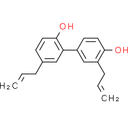Description
Honokiol is a natural product, which is extracted from the bark or seed cones of the Magnolia tree have been widely used in traditional medicine in China, Korea, and Japan. Houpu has traditionally been used in Eastern medicine as analgesic and to treat anxiety and mood disorders. In China, magnolia bark is called Houpu and is most commonly taken from the Magnolia obovata and the Magnolia officinalis species. In the late 1990s, honokiol saw a revival in interest as a potent and highly tolerable antitumorigenic and neurotrophic compound.
Product information
CAS Number: 35354-74-6
Molecular Weight: 266.33
Formula: C18H18O2
Synonym:
Houpa
Hnk
Chemical Name: 2-(4-hydroxy-3-prop-2-enyl-phenyl)- 4-prop-2-enyl-phenol
Smiles: C=CCC1=CC(C2=CC(CC=C)=C(O)C=C2)=C(O)C=C1
InChiKey: FVYXIJYOAGAUQK-UHFFFAOYSA-N
InChi: InChI=1S/C18H18O2/c1-3-5-13-7-9-18(20)16(11-13)14-8-10-17(19)15(12-14)6-4-2/h3-4,7-12,19-20H,1-2,5-6H2
Technical Data
Appearance: Solid Power
Purity: ≥98% (or refer to the Certificate of Analysis)
Solubility: DMSO: 53 mg/mL(198.99 mM). Water: Insoluble.
Shipping Condition: Shipped under ambient temperature as non-hazardous chemical or refer to Certificate of Analysis
Storage Condition: Dry, dark and -20 oC for 1 year or refer to the Certificate of Analysis.
Shelf Life: ≥12 months if stored properly.
Stock Solution Storage: 0 - 4 oC for 1 month or refer to the Certificate of Analysis.
Drug Formulation: To be determined
HS Tariff Code: 382200
How to use
In Vitro:
Honokiol shows pro-apoptotic effects in melanoma, sarcoma, myeloma, leukemia, bladder, lung, prostate, oral squamous cell carcinoma and colon cancer cell lines. Honokiol is effective on inducing apoptosis in SVR angiosarcoma cells. Treatment of SVR cells with honokiol causes decreased phosphorylation of MAP kinase, akt, and c-src. In addition, honokiol potentiates TRAIL-mediated apoptosis, and honokiol cytotoxicity is partially abrogated by neutralizing antibodies to TRAIL. Honokiol also has direct antiangiogenic activity, in that honokiol blocks the phosphorylation and rac activation due to VEGF-VEGFR2 interactions. Honokiol causes apoptosis in CLL cells through activation of caspase 8, followed by caspase 9 and 3 activation. Honokiol prevents interleukin-4-mediated survival of CLL cells, and potentiats the cytotoxicity of chlorambucil, fludarabine, and cladribine. Honokiol kills myeloma cells from relapsed patients at doses that does not kill PBMCs. Caspase 3, 7, 8, and 9 are induced by honokiol treatment, as well as PARP cleavage. Honokiol is found to induce apoptosis in the colon cancer cell lines RKO. Honokiol potentiates apoptosis, suppresses osteoclastogenesis, and inhibits invasion through modulation of nuclear factor-kappaB activation pathway. Honokiol may act as a potent anti-inflammatory agent with multipotential activities due to an inhibitory effect on the PI3K/Akt pathway.
In Vivo:
Honokiol is highly effective against SVR angiosarcoma in nude mice. Honokiol inhibits the growth of RKO cells in murine xenografts. Honokiol prevents the growth of MDA-MD-231 breast cancer cells in murine xenografts.
References:
- Battle TE, et al. Blood, 2005, 106(2), 690-697.
- Ishitsuka K, et al. Blood, 2005, 106(5), 1794-800.
- Bai X, et al. J Biol Chem, 2003, 278(37), 35501-35507.
Products are for research use only. Not for human use.
Payment & Security
Your payment information is processed securely. We do not store credit card details nor have access to your credit card information.


